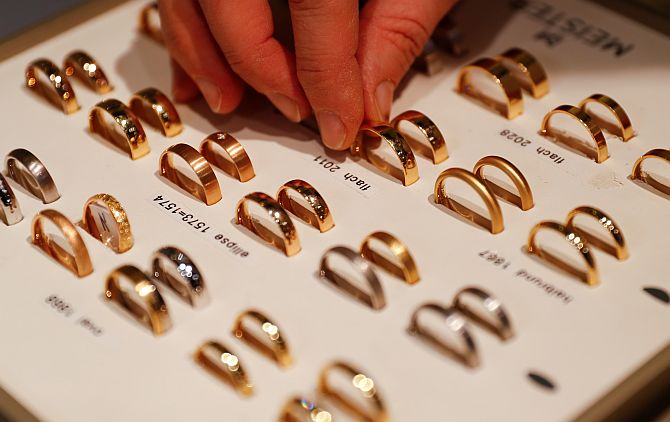Jewellers initially feared the ban applied on them.
However, after discontinuing their monthly schemes for almost two weeks, they've started accepting deposits again.
Dilip Kumar Jha reports.

A month after the ban on unregulated deposits, some questions still remain unanswered.
For instance, whether deposits taken by jewellers from customers are acceptable, especially when jewellers are not regulated.
Jewellers initially feared the ban applied on them, too.
However, after discontinuing their monthly schemes for almost two weeks, they've started accepting deposits again.
Gold jewellers have several monthly deposit schemes, to expand their working capital and to enable customers in jewellery purchase on maturity.
Titan Company, the Tata venture which sells the Tanishq brand of jewellery and fashion accessories, has a 'Golden Harvest' scheme -- one deposits a minimum of Rs 2,000 a month for at least 10 months.
The company offers a discount equivalent to 55% to 75% of the first instalment at the time of redemption in the 11th month.
Similarly, Tribhovandas Bhimji Zaveri offers a scheme of a minimum Rs 1,000 a month for nine months; the company offers 0.75% of the first instalment in the 10th month.
Another jeweller, Waman Hari Pethe, offers the equivalent of one instalment as an incentive to customers on regular deposits of 12 months.
Others run similar schemes.
"By definition, all deposits accepted by jewellers will fall within the purview of the ordinance. Hence, there is a need for the government to look at instances where the intent is not within the definition of deposits. There should be exceptions or some monetary limit for instances like loans from friends or jewellery schemes," said Abhishek A Rastogi, partner at law firm Khaitan & Co.
The ordinance, promulgated last month, defines a deposit as money received by way of an advance or loan or in any other form, by any deposit taker, with a promise to return after a specified period or otherwise, either in cash or kind or as a specified service, with or without any benefit in the form of interest, bonus, profit or in any other form.
This language suggest it covers the deposits that jewellers are taking and, hence, are disallowed.
Jewellers, though, have found a way out.
They show the advance sales against which they are getting payment in monthly instalments.
"All deposits settled within one year without accompanying interest are legal. Jewellers now adjust the interest by giving away the discount largely towards making charges," said Surendra Mahta, secretary, India Bullion and Jewellers Association.
After the ordinance, jewellers prepare a tentative bill of the sum equivalent to the monthly deposits and interest on maturity for a customer on the day of enrolment in the scheme.
Once the tentative bill is generated, which the jeweller keeps, all deposits mentioning the bill number would be considered as advances under the law.
Jewellers do not mention the interest component on the bill, to escape the regulatory glare.
In fact, the interest component works out to around 8.33%, very much within the purview of the regulatory threshold of 10 per cent.
Repeated efforts to reach Titan Company did not elicit a response.
"It is clear that the various retail schemes under which jewellers accept advance payments from customers shouldn't come under the purview of the ordinance," says Ahammed MP, chairman, Malabar Gold & Diamonds.
"Under such schemes," says Ahammed, "jewellers accept payments for a tenure of a few months and at the end of the tenure, customers purchase jewellery equivalent to the value of the total payment. It's like an advance against sales.
"So, this shouldn't come under the ambit of the ordinance," Ahammed adds.